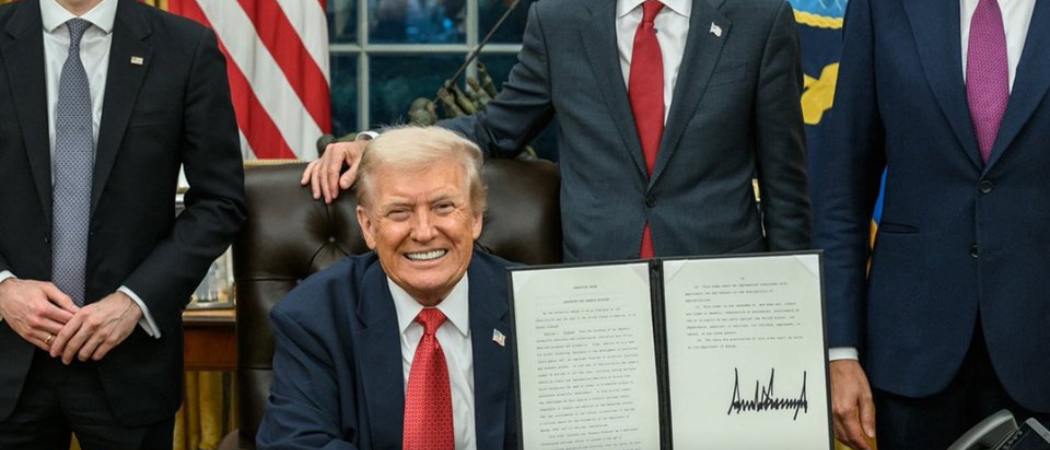As Trump launches the Genesis Mission, experts ask: is it time for a global effort?

President Trump signs an order launching the Genesis Mission for AI in science. Photo credits: White House X account.
A new Trump administration plan to expand the use of artificial intelligence in US science could greatly boost research productivity. But according to analysts, it also highlights a need for more global cooperation in AI development.
The Genesis Mission announced by the White House on November 24 aims to turn much of the US government’s existing network of databases and supercomputers into a massive AI development platform that private and public researchers can tap into, speeding discoveries in energy, health, security and other fields.
A White House statement likened Genesis to the wartime Manhattan Project that developed the atom bomb. The Department of Energy, which is leading much of the work, promised “to double the productivity and impact of American science and engineering within a decade.” It will also “ensure that America is the global leader in artificial intelligence.”
It may also galvanise other countries into more action. “AI is poised to transform the way we do science and engineering,” said Holger Hoos, an AI professor at Germany’s RWTH Aachen University. “The pressure is mounting, especially on Europe but also on Japan, Canada and India, to do something.” He has joined several other AI experts in urging a global, multinational initiative to ensure that AI-powered science is reliable, open and unbiased by the two leading AI powers, the US and China.
The EU, too
The EU has already started such a multilateral effort in its Horizon Europe programme, but it has been criticised as too small and decentralised. On November 3 the European Commission launched the Resource for AI Science in Europe (Raise), to connect AI databases, tools and researchers across the EU, with possible participation of some allied countries. However, critics note, it starts with just €107 million for 2026 and 2027. Canada, the UK, Japan and others have been developing AI-in-science plans of their own.
But the US lead is already huge. Over the past few years, the highest-profile AI advances have come from US labs and companies. The seven biggest US tech companies, with sky-rocketing stock market valuations, are pouring hundreds of billions of dollars into new AI centres and products. This year, about three-fourths of the world’s high-powered AI computing centres are American, according to Epoch AI, a San Francisco research institute; China has 15% and the EU 5%.
And US government support has been massive. In 2022, Congress authorised nearly $50 billion for investment in the semiconductor industry, a key to AI success. This year, President Trump has been the AI industry’s biggest booster, planning billions of dollars in support for US chip-makers Intel and Nvidia, strong-arming foreign tech companies to invest in the US, and setting out America’s AI Action Plan promising further investment, an AI education initiative, a ban on “woke” AI applications, and the science initiative announced this week.
The AI platform
According to the White House, the Genesis Mission entails the Department of Energy creating a “closed-loop AI experimentation platform” that will knit together the databases and supercomputers of the government’s 17 main national laboratories. With it, the aim is to train new AI “scientific foundation models” that can test hypotheses and automate research. The initiative will also involve universities, research infrastructure, factories, security facilities and big companies. According to the Department of Energy, this will include Microsoft, Nvidia, Google, Amazon and other US tech giants. Research applications can be in security, biotechnology, critical materials, nuclear fission and fusion, space, quantum and semiconductors.
Trump’s order gives Michael Kratsios, his top science advisor, the job of coordinating the inter-governmental work. Within 90 days, the order says, the mission is to identify relevant government facilities for the mission. And by September 2026, the AI platform is supposed to be working on at least one big challenge. “Research that once took years could now take weeks or months,” the White House said in a press statement.
But the plan is notably silent on how much will be budgeted, or when. In the first year of planning, analysts said, the money will apparently come from repurposing existing funds. After that, the focus will probably switch to the next Congressional budget cycle, with “encouraging signs of bipartisan support for advancing AI for scientific discovery,” according to Hodan Omaar, a senior analyst with the Information Technology and Innovation Foundation, a Washington think tank. Certainly, she said, “sustaining long-term growth will depend on significant Congressional appropriations.”
But is it safe?
The implications of AI in science are huge. The speed, data handling and productivity of AI have already been seen in simulations of protein chemistry, a development that won two Google DeepMind researchers a Nobel prize in 2024. More generally, among the potential benefits of AI in science are faster drug development, nuclear fusion simulations, enhanced cyber-security and new materials. Among the risks: AI that hallucinates clinical-trial data for medicines, biases economic and social science with a particular ideology, or opens the door to new cyber-attacks.
But AI specialists say those risks can be managed, if the development is conducted fairly, openly and transparently. The dramatic US news could spur international action to achieve that.
Related articles
- The EU’s AI in science plan gets a mixed reception
- EU launches AI strategies to boost competitiveness and science
- Horizon calls in 2026-27 lay groundwork for new AI in science strategy
According to Holger Hoos at RWTH, questioning whether AI should be used in science is like “having asked 200-plus years ago: ‘Is it a little bit dangerous to use mathematics for scientific progress?’ And 50 years ago: ‘Is it a bit dangerous to use computers for science?’ It’s not the first time we face such a concern. There is a tendency to push science forward, but it is important to not do that blindly and indiscriminately.”
A solution he and many AI researchers advocate is stronger international collaboration. A white paper published this week by 29 top AI researchers including Hoos argues that countries must band together in a multinational development effort; otherwise, they risk either being dependent on US and Chinese technology, or cut out of economic and other benefits of AI. A budget on the order of $10 billion is needed, Hoos says, far bigger than current EU plans.
The White House order does raise the possibility of partnership, barely. It says Kratsios “shall, to the extent appropriate, identify opportunities for international scientific collaboration to support activities under the Mission.” Exactly what that means, said ITIF’s Omaar, “is likely a question for down the line” rather than now. The first priority would be organising the mission domestically.
Kratsios’ office didn’t respond to a Science|Business request for further information.
But Hoos sees the Genesis news as a catalyst for other nations. “It would be wonderful to do this in a multinational way, rather than everybody going unilaterally,” he said.





 A unique international forum for public research organisations and companies to connect their external engagement with strategic interests around their R&D system.
A unique international forum for public research organisations and companies to connect their external engagement with strategic interests around their R&D system.